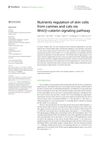TLDR IPM enhances skin penetration of hydrophilic drugs.
The study examined how the rheological properties and composition of lecithin reverse wormlike micelles (LRWs) affect the skin permeation of a hydrophilic drug. Using D (-)-ribose or glycerol as polar compounds, and liquid paraffin or isopropyl myristate (IPM) as oils, with 6-carboxyfluorescein (CF) as the drug model, it was found that LRWs have moderate viscosity at 25°C but lower viscosity at 32°C, aiding skin penetration. The highest skin permeability of CF occurred with IPM, indicating that both the stratum corneum and hair follicle routes are involved in drug permeation, and that IPM's interaction with sebum enhances follicular penetration.
 39 citations
,
November 2016 in “Pharmaceutics”
39 citations
,
November 2016 in “Pharmaceutics” The hair follicle pathway significantly affects how easily water-loving chemicals pass through the skin.
 34 citations
,
October 2014 in “European journal of pharmaceutics and biopharmaceutics”
34 citations
,
October 2014 in “European journal of pharmaceutics and biopharmaceutics” The new drug delivery system releases the drug better in sebum and targets follicles more effectively than the conventional cream.
 202 citations
,
June 2005 in “Aaps Pharmscitech”
202 citations
,
June 2005 in “Aaps Pharmscitech” Lecithin organogels could be good for applying drugs to the skin because they are stable, safe, and can improve drug absorption.
 202 citations
,
June 2005 in “Aaps Pharmscitech”
202 citations
,
June 2005 in “Aaps Pharmscitech” Lecithin organogels could be good for applying drugs to the skin because they are stable, safe, and can improve drug absorption.
 12 citations
,
August 2017 in “Archives of Pharmacal Research”
12 citations
,
August 2017 in “Archives of Pharmacal Research” Lecithin-based microparticles can deliver minoxidil for hair growth effectively with less skin irritation.
 47 citations
,
July 2014 in “European Journal of Pharmaceutics and Biopharmaceutics”
47 citations
,
July 2014 in “European Journal of Pharmaceutics and Biopharmaceutics” Scientists created a gel with nanoparticles to deliver medicine to hair follicles effectively.
 February 2025 in “Frontiers in Veterinary Science”
February 2025 in “Frontiers in Veterinary Science” Certain nutrients like keratin, egg yolk, and fish collagen may help pets regrow hair.
 18 citations
,
August 2019 in “Drug Development and Industrial Pharmacy”
18 citations
,
August 2019 in “Drug Development and Industrial Pharmacy” Quercetin-loaded nanoparticles can penetrate skin, minimize hair loss, and promote hair regrowth, showing slightly better results than a marketed product.







